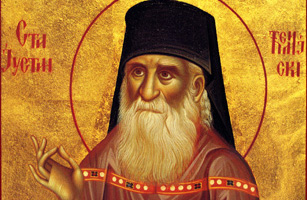Life & Faith
A Paschal Homily of Blessed Justin of Chelije
 Sentenced to Immortality
Sentenced to Immortality
Man sentenced God to death; by His Resurrection, He sentenced man to immortality. In return for a beating, He gives an embrace; for abuse, a blessing; for death, immortality. Man never showed so much hate for God as when he crucified Him; and God never showed more love for man than when He arose. Man even wanted to reduce God to a mortal, but God by His Resurrection made man immortal. The crucified God is Risen and has killed death. Death is no more. Immortality has surrounded man and all the world.
Fifth Sunday of Great Lent - St Mary of Egypt
Synaxarion
On this day, the fifth Sunday of Great Lent, we celebrate the memory of our holy and venerable Mother, Mary of Egypt.
The recorder of the life of this wonderful saint is St. Sophronius, Patriarch of Jerusalem. A hieromonk, the elder Zossima, had gone off at one time during the Great Fast on a twenty-days' walk into the wilderness across the Jordan. He suddenly caught sight of a human being with a withered and naked body and with hair as white as snow, who fled in its nakedness from Zossima's sight. The elder ran a long way, until this figure stopped at a stream and called, "Father Zossima, forgive me for the Lord's sake. I cannot turn around to you, for I am a naked woman." Then Zossima threw her his outer cloak, and she wrapped herself in it and turned around to him. The elder was amazed at hearing his name from the lips of this unknown woman. After considerable pressure on his part, she told him the story of her life.
Bishop Dr. Jovan (Puric): The Mystery of Theotokos in Byzantine Hymnography
Theotokology in Hymnography of St. John of Damascus
The name of the Virgin Mary is encountered not only in the Holy Scripture[1] and the Holy Tradition, but is mentioned in the entire life of the Orthodox Church: in divine worship, hymnography, iconography and music. Of special importance is the fact that the divine services of the Orthodox Church repeat the entire Theandric Economy of Salvation.[2]
The Church’s Engagement with the World – Witnessing as the Church’s Method
The complex, polymorphous and fluid problematics of the (“post-Christian”) present have presented the Church – the universal Body of Christ and us Christians, godlike personalities that are the reason-bearing limbs of that Body, with an unprecedented challenge[1] in the history of Christianity thus far, one that we cannot, even if we should wish to, ignore, overlook or suppress. As an answer to this dramatic challenge, we must offer a living and creative Christian answer – a personal-universal witnessing of the present Church generation, an answer articulated on the basis of the Church’s universal traditional experience and a personal experience of faith as our active inclusion in that universal experience, if we wish to fulfill Christ’s commandment – to be the salt of the earth and the light of the world (Mt 5:13, 14), to truly be Christians.
The Lenten Prayer of St. Ephraim
+ O Lord and Master of my Life, take away from me the will to be lazy and to be sad, the desire to get ahead of other people, and to boast and brag.
+ Give me instead a pure and humble spirit, the will to be patient with others and to love them.
+ Grant O Lord, that I may see my own mistakes, and keep me from judging
the things other people do. For you are blessed, now and forever, and to ages of ages. Amen.
+++
Liturgy of the Presanctified Gifts
As we already have seen, the eucharistic Divine Liturgy is not celebrated in the Orthodox Church on lenten weekdays. In order for the faithful to sustain their lenten effort by participation in Holy Communion, the Liturgy of the Presanctified Gifts is served. The service is an ancient one in the Orthodox Church. We officially hear about it in the canons of the seventh century, which obviously indicates its development at a much earlier date.

